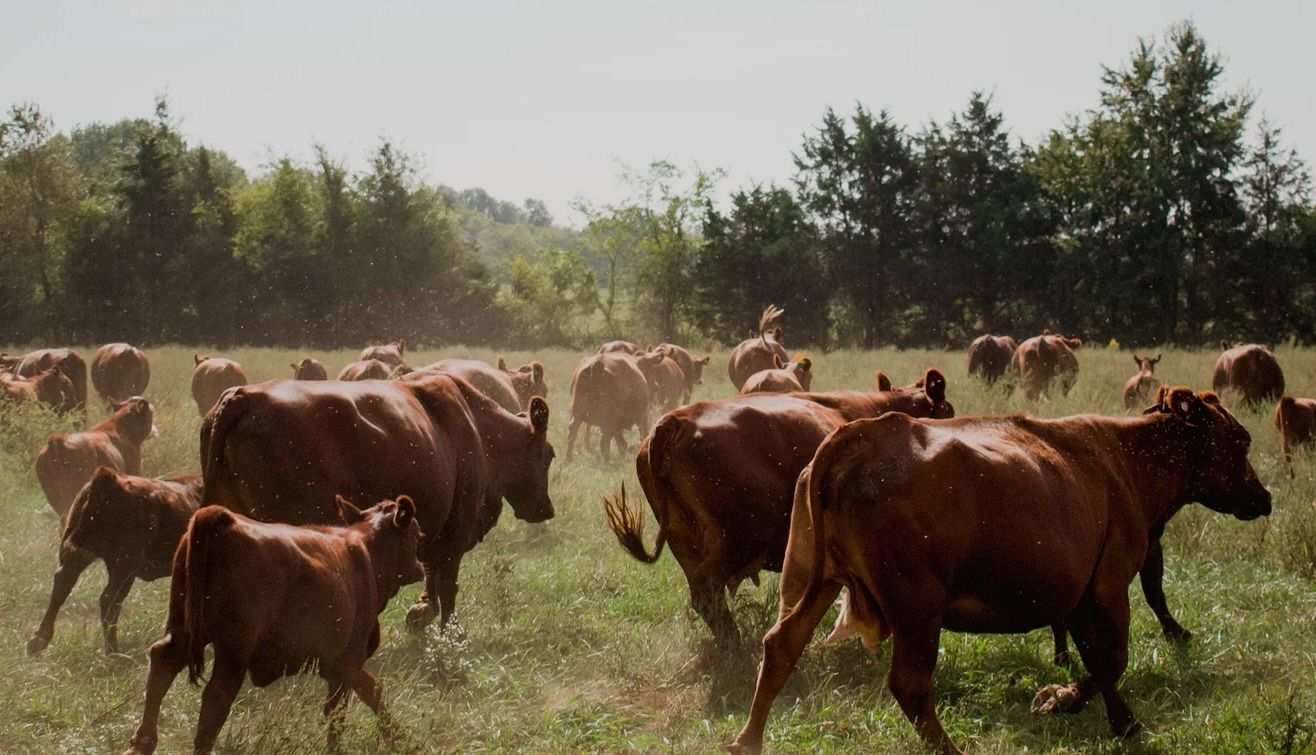
Regenerative Land, Regenerative Community
Crossing Creeks Farm found its place, but now they lend a hand to other local farms
Elizabeth Stuart has always been passionate about agriculture. After four years of “learning how not to farm” getting her degree in Agricultural Business, she spent ten more relearning as she and her husband built Crossing Creeks Farm in Shelbyville. While blessed in the process of getting the farm off the ground, reaching a stable point took years and financial strain. That’s why they’ve recently started a non-profit organization, The Bridge at Crossing Creeks, to lend a helping hand to other small farmers getting started.
HUMBLE BEGINNINGS
Around 2008, Stuart and her husband began working with cattle when her parents “went on their crusade” to produce grass-fed beef. Both had experience with large animals from working with horses in their youth, so they began leasing from a family friend to further develop their skills, specifically with cattle. Luckily, that family friend also functioned as a mentor. Stuart and her husband wanted to take on regenerative farming. “We wanted to know all of the inputs of the animal to the finished product,” says Stuart, who adds that eventually, this desire was what led them to breed from their herd.
Regenerative farming is “less hands-on with the cattle,” explains Stuart. “It’s more about letting them be cattle.” When the pair started Crossing Creeks in 2012, they took on intensive adaptive rotational farming. That means every day, the cattle are moved to a new patch of grass—beyond that, they are largely left alone. Over time, the couple's “eye for [their] animals” became even more honed. “We’re so many generations away from true animal husbandry,” Stuart states, “and we’ve lost a lot of that instinct that was there for centuries.”
Regenerative farming practices are at the core of Crossing Creeks because they go hand in hand with raising grass-fed beef. “You can’t do [grass-fed] without knowing about your soil health,” declares Stuart. “We’re utilizing the grasses to feed the animals, so the healthier our soils are, the healthier our animals are. Everything we do benefits the ground under our feet that you can’t see.” Connection to the animals is as important as connection to the land.
BUILDING IT UP
From 2012 to 2019, Stuart and her husband were busy—building their home, fencing, installing miles of water line, and raising two sons. “I just remember how slow it felt, because… money,” she remarks. Over the same period, they branched out to pasture-raised chicken, turkey, and even hogs. Her husband and father traveled to Nashville four times a week to work in commercial construction, so Stuart spent all day tending to the property, animals, and children.
In 2019, Crossing Creeks was finally able to open its farm store, and things have become even more full-time since. “The farm has just exploded,” muses Stuart, before listing out all of the things they’ve added in the years since: a campsite with cabins and RV hookups, an Airbnb house, horseback riding, and a commercial kitchen trailer. Recently, Crossing Creeks also started a digital magazine to offer recipes, how-tos, and news from the farm.
The Bridge at Crossing Creeks is about helping other farmers get into and stay within the agricultural industry. After the struggles Stuart experienced, she “felt a calling to raise funds… to hand out grants to regenerative farmers with no strings attached.” It’s about her own personal experiences as much as it is the big picture: The food supply in the United States is bogged down with unhealthy, unsustainable agriculture. “If we want to see an impact on our food supply in this country, we need to support regenerative farmers,” she states, “for both the land and the food.”
Farmers, especially regenerative farmers, have to fight to get on their feet. Stuart explained that she’s seen a lot of young, excited people get started—only to find themselves leaving the business before year five. According to the National Rural Health Association, farmers are 3.5 times more likely to take their own life than the average person. Part of The Bridge at Crossing Creeks is just to say, “Hey, you’re seen and we’re here.”
A couple of months ago, The Bridge gave its first grant: three thousand dollars to a young couple growing produce on their own regenerative farm. They’re looking forward to raising more funds and helping others promote healthy farms and food. Over time and with enough focus, things can get better for people—farmers and consumers alike.
